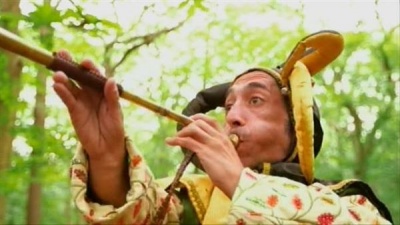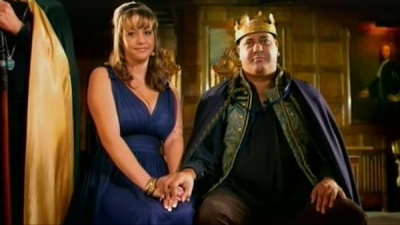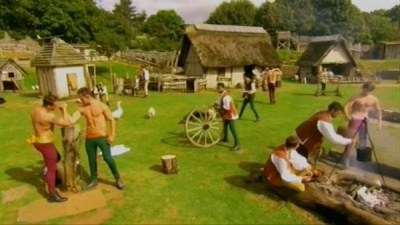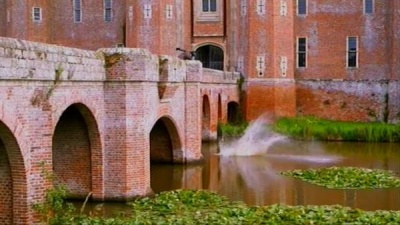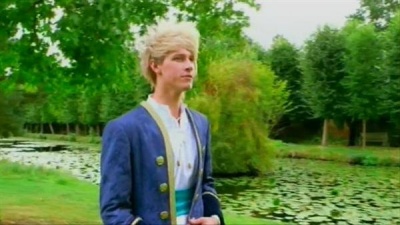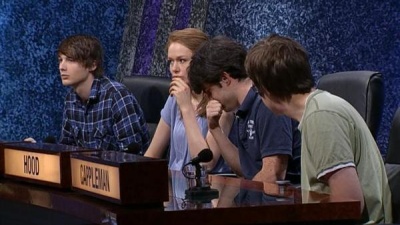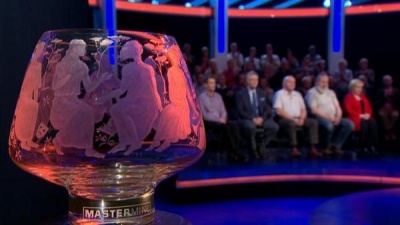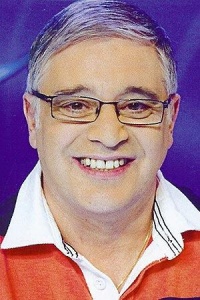Weaver's Week 2013-03-24
Last week | Weaver's Week Index | Next week
"Build it and they will come!" is the traditional cry. But what happens when you do build something, and no-one comes?
Contents |
My Little Princess
IWC Media / Mad Monk for E4, from 25 February
The average dating show boils down to a bunch of blokes trying to impress one woman enough that she will consent to date them. Blind Date did it with corny jokes and unsubtle innuendo. Take Me Out does it with a system of lights and even more unsubtle innuendo. Dating in the Dark did it with a system of no lights and see-in-the-dark cameras. My Little Princess takes the idea of men doing silly things to impress a woman, and cranks it up, and up, and up. So far up that it stops being a dating show, and starts being a men doing silly things show.
The basic story – as announced late last year by a parchment scroll, dispatched from Channel 4 Towers by a Channel 4 Minion – is that there is a fairytale king. We can tell he is a king by the way he wears a cheap tin crown, and sounds like Robert Kilroy Iconic-Hand-Gesture. He wants nothing but the best for his daughter, and will select only the finest specimen of manhood for her. To judge the quality of the eight candidate princes, he will set them tasks, until his daughter chooses her companion from his approved list of two.
So, what are these challenges? The programme begins by introducing the week's seven contestants. Seven? Weren't there eight candidates? Ah, but the worst performer on the assault course is not only eliminated from that week's show, he is covered by the Erasure of Ineptitude, and the record is written as though he never started. For the rest of the princes, the assault course is an excuse to show their name, their face, and a salient fact about them. It's a bit like what The Krypton Factor '95 did with its assault course: stick it at the beginning, and use it as an excuse to introduce the players. Unlike The Krypton Factor, this assault course isn't a legend in its own right, but it is played out to a cheesy soft rock track.
The kingly father then gets to meet the contestants, on a wooden contraption variously described as the Catapult of Compatibility, or as the Trebuchet of Truth. Here, the father asks questions of the young man, who is nestling in a pile of cushions piled high on a wooden seat. These can be questions about his daughter: "does my daughter believe the world is run by giant reptiles, or by small mice?" That sort of everyday question. Or they can be questions about the candidate. "Have you ever made a secs tape?", presumably the sort where one takes some cosines and films them with the camera upside down.
Should the answer please the father, then nothing will happen. Should he be displeased by the answer, then the young man will soon be elevated into the air, as his seat suddenly flies from the horizontal to the vertical position. Though the seat will be arrested in the vertical plane and will not continue along this trajectory, the young man will, and he will shortly enter the Lake of Losers while making a very satisfactory splash, better than anything we saw on ITV. And all of this will be played in slow motion, while some cheesy soft rock track plays.
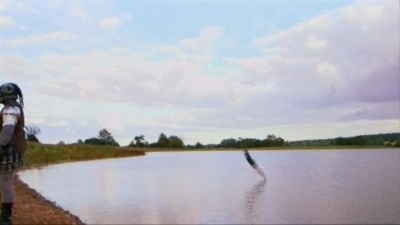 Beat that, Splash!!
Beat that, Splash!!
And so it goes on: young men dress up as giant oversized mice and run into each other. Young men dress up as birds and bounce up and down while deflecting footballs away from a picture of the young princess's dog. Young men step into puddles based on which man they think has tattoos of Irish turn-of-the-millennium band The Corrs on his back. Young men give gifts based on the choices offered by a talking horse, hoping to avoid falling through a trapdoor into a foetid water pool. And all of this happens with enough cheesy soft rock for Emma N. Thal, Gord an' Zola to build a house in Cheddar. And call it George.
My Little Princess is able to work on at least two levels. It can be seen as a standard dating show, with the daughter trying to convince her father not to eliminate someone she's got her eye on. And it can be seen as a Very Silly show, along the lines of Total Wipeout, with willing victims doing stupendously stupid things for the entertainment of father in particular, but also the viewing public in general. How silly? Very Silly. After the father has made his decision, a Dark Knight invades the princely encampment, finds the rejected suitor, and pushes him off of a bridge into the castle moat.
We'll be honest, we really don't care for dating shows, and we do like the right sort of Very Silly. The round in which the suitors are judged on mock-ups of "their babies" (a computerised melding of current photographs) felt out of place, as too serious and insufficiently funny. We're not going to criticise the inclusion of a "lie detector" in the Trebuchet of Truth (this column's opinion is in the Tool Academy review from early 2011.) This piece of pseudo-science is handled by the castle's resident wizard, entirely appropriate for something that is even less accurate than claims of alchemy.
The cheesy soft rock soundtrack is the calling card of Gary Monaghan, a man with some spectacular cult hits under his belt. Banzai was a breakout hit in E4's early days, Hercules remains the best series BBC3 has done (yes, even better than the guff they show instead of the interval acts in the Eurovision semi-finals). Cheesy soft rock is the hallmark of the final round, in which the last two sing a cheesy soft rock song, the likes of Starship or Bonnie Tyler, in the hope of impressing the princess. And they don't just sing the song on a stage: no, they wander around the garden, as though they're making a cheesy soft rock song video, all soft focus and intercutting.
Silly, entertaining, and mostly inventive. How could My Little Princess possibly fail? Something went wrong somewhere – the scroll we received last year promised the new series would begin in "late January", which became "late Janufebruary". The first episode went out opposite the last of Charlie Brooker's "Black Mirror" dramas, the 10pm timeslot required a higher level of smut, and we think the title put off a lot of blokes who thought "Princesses? Stuff this, it'll be all pink and fluffy and threaten my privileged position at the top of the patriarchal tree. Go get me a beer and we'll watch United Netbusters on UKSports. My remote, my rules."
Fewer than 250,000 people saw the first episode, it's suggested that episode two averaged less than 100,000 viewers, and the show has been shunted back from 10pm to the oh-so-competitive slot of 1 o'clock on Tuesday mornings. This is a dashed shame, My Little Princess deserves so much better. Possibly a pre-watershed edit.
University Challenge
Group phase, match 7: St George's London v New Oxford
Cambridge colleges Pembroke and King's fell to these sides, and after a slow start, St George's pull away thanks in part to their knowledge of the grazing habits of sheep. As one does. Neither of the sides is able to identify the design on a commemorative five pound coin; this may tell us something about the traditional penury of the student. St George's has a 30-10 lead.
Confusion between diphthongs and digraphs doesn't help New, and the number of people who understand their bonus set on stem biology may be precisely one, the question author. We did appreciate the unexpected clue at the end of this starter:
- Q: With a 500-year history, which building has been a poorhouse, a mental institution, and in the 17th century, the hunting lodge of the Elector of Saxony? Recently, it was transformed into a youth hostel to encourage people to escape to it, rather than from it.
The teams combined to answer 5 of the first 21 bonuses correctly; New got 3/3 on words sharing the same first two letters, briefly giving them the lead. Ballets inspired by fairy stories was the audio round, and that allowed St George's back in front, 80-60. There's a question about Jon Snow – not the fan of loud ties, but the investigator into diseases. Alexander Suebsaeng zigs with the disease (cholera) rather than zagging with the year, and is correct. His reward was scant – questions on an algebraic matrix – but he's taking a gamble and it's paying off, at least a 20-point swing.
New get a number of starters, allowing them to draw within five, but no bonuses. One of their sets of bonuses is on words that begin "ant"; on this challenge they fail to score. It would be unfair and incorrect to repeat the catchphrase from the end of "Challenge Ant". St George's lead of 95-90 is overturned when New gets the visual round, pictures of authors who turned down honours of the British Empire.
Having secured the lead, and survived a set of questions on frigid zones of the world (such as the UK right now), New extend to 30 points, only for St George's to pull back a little way, scoring five in one little second. Or, to use Thumper's definition, the angle subtended by a length of 1.4959 times 10 to the 11 metres at a distance of 3.0857 times 10 to the 16 metres.
With time running down, New restore their 30-point lead, and it feels like Remi Beecroft's answer of "Niagara Falls" has put them far enough ahead. At the gong, New has the win, by 160-110. New qualify for the semi-finals, St George's will play against Bangor on a date to be confirmed.
Next week, Pembroke and King's meet, with the winners to play Manchester.
Mastermind
Semi-final 5
The first player hoping to warm us up tonight is Paul Whittaker (Birds of Britain). A round about creatures of the class Aves in Britain. The bird adapted to eat from pine cones, the owl nesting in depressions, and the sawbill duck. This contender storms through his round, just one error, 11 (0). Bill more: "Birds" at the Hitchhikers Guide to the Galaxy.
Jon Chadwick will tell us about the Films of Takeshi Kitano (b 1947). Best known in these parts for his eponymous Castle, Takeshi is also known for his films, which feature long, languid, gentle pans across a placid countryside before a massive fight breaks out. The same style is used on Big Brother. His best-known work in front of the camera is the film Battle Royale*, it's The Hunger Games without cheese. A couple of near misses, 8 (1).
Sean Howley takes Newcastle United since 1945. Three FA cups, one Fairs cup, plenty of years in Division II, Kevin Keegan as player and manager, and precisely no league titles. The highs (Feyenoord) and lows (Hereford) are here, closing on 7 (1). More (er) Gallowgate: Newcastle Utd's website
Alcuin Edwards has been studying the Jagiellon Dynasty (1386-1572). A family of monarchs in eastern Europe, founded by the marriage of a Lithuanian to a Pole, and spreading south to Bohemia and Hungary. The round progresses with a suitable degree of majesty to 6 (1). Know more: the Encyclopaedia Britannica article
Helen Marshall was reading the Adam Dalgliesh mysteries of PD James (1962-). Described in James's works as "ruthless, unorthodox, working always against time," Dalgleish is an intense and solitary character who uses the evidence to solve cases accurately. A very strong round finishes on 11 (1). Solve more: The Lighthouse*.
Mr. Edwards won a low-scoring game on 30 November, when his specialist subject was Alice Cooper. His first general knowledge answer here is Lulu. Just as in the first round, the contender has a strong general knowledge, though it begins to fall away a little towards the end. 16 (3) shouldn't be a winning score, but strange things have happened in this series.
Sean Howley got here on 7 December, when US Military Aircraft was his subject. In next to no time, he's moved into the teens, scoring with the Moonies and knowing who is the host of Only Connect. Jolly good chap, a shame he only scores 19 (2).
We're not asking Jon Chadwick to balance on the skipping stones; he won on Mastermind with HP Lovecraft on 12 October. This contender gives very authoritative answers, perfectly enunciated, but many of the answers are incorrect. This isn't The Announcers' Challenge, so the final score is 13 (5).
Two runners-up in the show this week: Paul Whittaker qualified from 5 October, when he played George Harrison. Nine to take the lead, and in spite of a pass early on, this doesn't cause much of a problem. Setting a mark for the last contender, that's his challenge, and a few slips towards the end leaves a little room to be beaten. 21 (2).
Helen Marshall took Catherine of Aragon on 19 October, a show from which three made the second phase. Eleven to win, few enough to be possible, enough to be an effort. Not that this contender seems to be strained, getting half-way there without drawing breath. A pass, then another, means that she will need to score the eleven, and suddenly it's looking a little unlikely that she'll reach the target. The time expires, and Helen has finished on 20 (5).
So Paul Whittaker has won a match, and will take his place in the final two weeks hence. April 5 is one of the very few Friday nights when there's absolutely no rugby taking place, and the final can air nationwide at 7.30.
This Week And Next
The Brain of Britain final was broadcast on Monday. Barry Simmons moved into an early lead, 5-2 ahead after one round, 9-4 after the next. Then the opposition began to catch up: Darren Martin and David Stainer trimmed Barry down to 9-5, and 11-7 as David moved clear in second place. The question setters manage to sneak in a reference to Robert Robinson – the research chemist, not the BoB host. In what was fast becoming a two-horse race, David trimmed the lead to 14-11, and then to 15-13. And that, surprisingly, is the end of the show – the music selections had run long, there had been more chatter, but we were expecting a seventh round. The champion receives his trophy from Mary Beard, the professor of Classics at Cambridge.
Ratings for the week to 10 March, supplied by BARB. Dancing on Ice finished with 6.65m viewers, just ahead of Saturday Night Takeaway (6.55m). In It to Win It Part 2 recorded 5.3m, the Let's Dance for Comic Relief final 4.85m, and The Cube scored 4.1m. University Challenge led on BBC2, just shy of 3m, with 8 Out of 10 Cats topping Channel 4 with 1.65m. ITV didn't run Tipping Point at 4pm, so Deal or No Deal rebounded to 1.4m, the red box club's highest rating since January. Celebrity Juice on ITV2 was seen by 1.985m, with Got to Dance 4 Live 5 by 515,000, and Come Dine with Me on More 4 by 444,000. We learn that Pop Idle Nigeria is airing on Africa Channel, where 24,000 see the performances.
Last year, Jessie J learned "that my eyes are my eyes, my ears are my ears and my heart is my heart." More basic biology and Incredibble Spinning Chairs when BBC The Voice of Holland of UK returns at 7pm next Saturday. Ant and Dec's secret weapon against the rotating devices is Piers Moron. Before that, Jonathan Ross is on Celebrity Deal or No Deal (C4, 7pm Sun), and there's a new run of The 3rd Degree (Radio 4, 3pm Mon).
To have Weaver's Week emailed to you on publication day, receive our exclusive TV roundup of the game shows in the week ahead, and chat to other ukgameshows.com readers, sign up to our Yahoo! Group.

